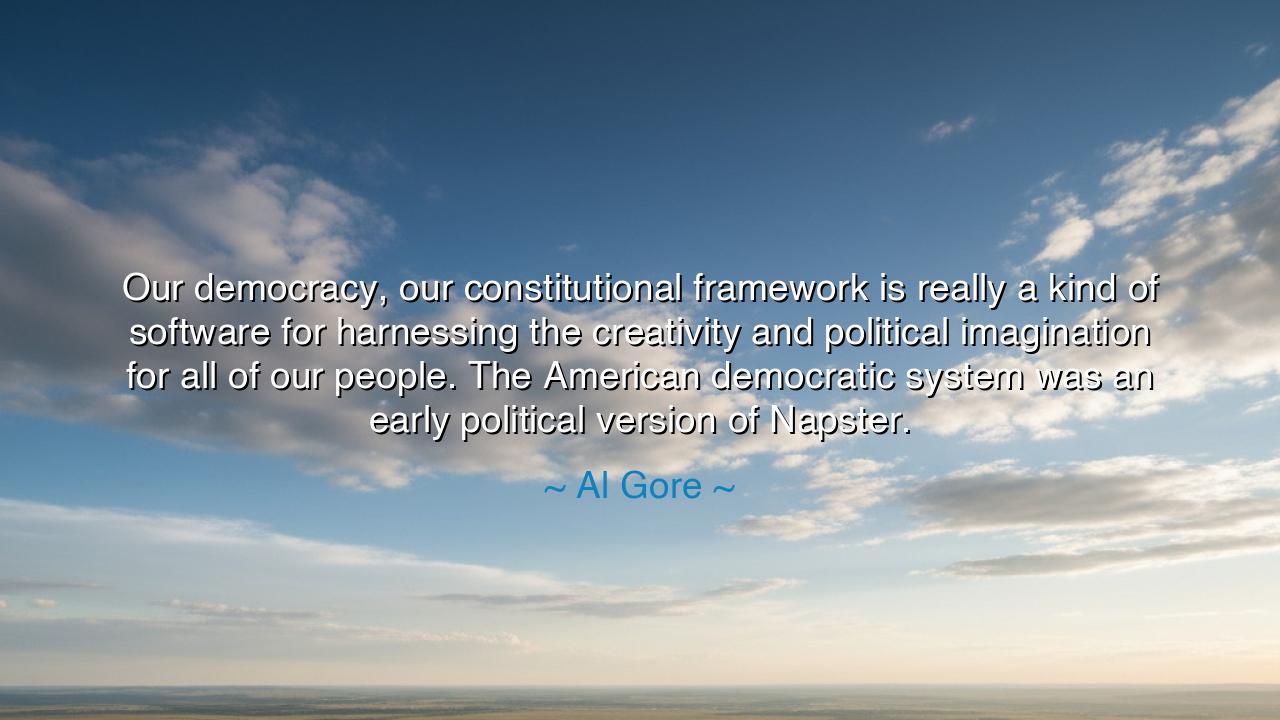
Our democracy, our constitutional framework is really a kind of
Our democracy, our constitutional framework is really a kind of software for harnessing the creativity and political imagination for all of our people. The American democratic system was an early political version of Napster.






In the words of Al Gore, spoken in an age of machines and electric thought, there shines a truth as timeless as democracy itself: “Our democracy, our constitutional framework is really a kind of software for harnessing the creativity and political imagination of all of our people. The American democratic system was an early political version of Napster.” These words, though born in the modern world, echo the same spirit that once stirred the founders of republics and the poets of freedom. For he speaks not merely of government or law, but of imagination — of the sacred architecture of minds joined together in pursuit of liberty. He reminds us that democracy is not a fortress of stone, but a living code written in the hearts of its citizens.
To call democracy a kind of software is to see it as the ancients saw their sacred laws — not as chains, but as instruments of harmony. In the old kingdoms, power was hoarded by the few, locked in towers of bloodline and gold. But the American Constitution, as Gore reminds us, was a new design, a daring invention — one that sought to harness the creativity of all, not the control of one. Just as the coder writes a program to awaken the power of the machine, so the founders wrote their charter to awaken the soul of a people. The “code” they forged was not static; it was meant to evolve, to adapt, to invite participation from each generation, as new voices joined the great conversation of liberty.
Gore’s comparison to Napster, that early network of shared music and ideas, is both playful and profound. Napster was a system where individuals, once separated by walls of ownership and hierarchy, could suddenly connect — freely, instantly, creatively. In likening democracy to such a network, he reveals its original and radical essence: that it is a system of sharing, not hoarding. It thrives when ideas flow, when citizens contribute, when the imagination of the many outshines the dominance of the few. Democracy, at its best, is not a static order but a symphony of collaboration — a song composed by millions of hands.
So too did the ancient Athenians, the first experimenters in self-rule, gather in their open forums to speak and to dream together. Their democracy, though flawed and limited by the boundaries of their time, was a revelation — a kind of early software for civic imagination. Each citizen was a node in a vast and living network, bound not by obedience to a king, but by the rhythm of shared discourse. And though that system fell to empire, its spirit endured, reborn centuries later across the ocean in the American republic, where new architects wrote code not on parchment alone, but in the collective will of the people.
History, too, offers lessons in what happens when this software of democracy is corrupted. When fear replaces curiosity, when division silences collaboration, when the code is rewritten for profit or power, the system falters. Consider the Roman Republic, whose grand experiment in shared governance gave way to empire because citizens ceased to believe their voice mattered. They became spectators rather than participants, and the software crashed beneath the weight of apathy and ambition. So too must we guard against such decay, for democracy survives only when the people remain creators within it — not consumers of its promises, but builders of its future.
And yet, Gore’s metaphor carries hope as well as warning. For just as software can be updated, so too can the constitution of a people. The framework of democracy is not a relic; it is an invitation — to imagine, to improve, to collaborate. Each new generation must write its own code of justice, its own design of inclusion, its own dreams of equality. The political imagination is not a luxury; it is the heartbeat of freedom. Without it, democracy becomes hollow; with it, it becomes eternal.
Therefore, my child, take this wisdom to heart: you are not merely a subject of democracy — you are its author. The creativity of your mind, the imagination of your spirit, the faith you hold in the unseen better world — these are the keystrokes that keep the code alive. Do not leave the writing to others. Question, dream, and build. Share your ideas as freely as songs once flowed across Napster’s web, for in sharing, the republic grows strong.
Let this be your guiding truth: democracy is not a gift handed down from the powerful, but a living creation sustained by the many. It is a great and sacred network of souls, woven by imagination and renewed by courage. As long as the people continue to dream together — to write, to speak, to hope — the software of freedom will never crash. And in that shared imagination, the magic of democracy will endure, shining brighter than any empire of gold or code of machines.






AAdministratorAdministrator
Welcome, honored guests. Please leave a comment, we will respond soon